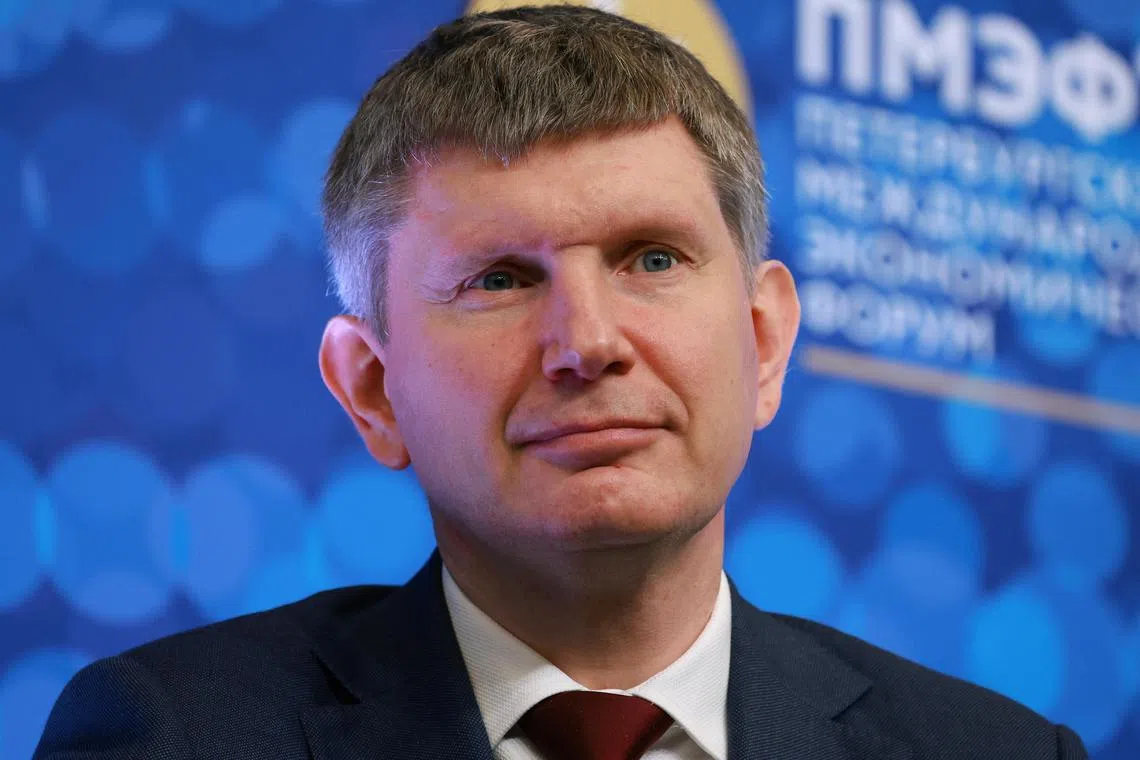Russia must not let economy slip into recession, says Putin, after minister issues warning
Sign up now: Get ST's newsletters delivered to your inbox

Participants watch Russian President Vladimir Putin's speech on a TV screen at the 28th Saint Petersburg International Economic Forum on June 20.
PHOTO: EPA-EFE
Follow topic:
ST PETERSBURG, Russia - Russia’s economy must under no circumstances slide into recession, President Vladimir Putin told an economic forum on June 20, in a clear instruction to assembled government ministers and central bankers.
The Bank of Russia hiked its key interest rate to the highest level since the early 2000s in October, seeking to curb stubbornly high inflation, before cutting it by one percentage point to 20 per cent earlier this month.
The Kremlin has said this easing did not go far enough, as the economy threatens to cool too quickly after running hot for two years thanks largely to huge increases in defence spending on the war in Ukraine.
“Our most important task is to ensure the economy’s transition to a balanced growth trajectory,” Mr Putin said, in a keynote speech at the St Petersburg International Economic Forum.
Consumer inflation is running at 9.59 per cent on an annual basis, according to the economy ministry, well above the central bank’s 4 per cent target, but has been gradually easing since late April.
“Balanced growth is moderate inflation, low unemployment, and continued positive economic dynamics... At the same time, some specialists and experts point to the risks of stagnation and even recession. This should not be allowed under any circumstances,” Mr Putin said.
Economy Minister Maxim Reshetnikov, in a downbeat message to Russia’s showcase economic event, said on June 20 that the economy was on the verge of sliding into recession and monetary policy decisions would determine whether it falls into one or not.
Pressure on the central bank is mounting.
Central Bank Governor Elvira Nabiullina, credited with steering Russia through a serious of crises since being appointed in 2013, has also faced criticism from lawmakers and prominent businessmen, often over high interest rates or rouble volatility. She has remained in post thanks to Mr Putin’s personal support.

Russian Economic Development Minister Maxim Reshetnikov delivered a downbeat message at Russia’s showcase economic event.
PHOTO: REUTERS
“It’s time to cut the rate and start heating up the economy,” Deputy Prime Minister Alexander Novak said on June 20.
Demand for credit is weak, said Mr German Gref, chief executive officer of Russia’s largest lender Sberbank, calling for faster rate cuts to incentivise companies to invest.
“It is especially worrying that we, as the largest bank, which finances... almost 60 per cent of all investment projects in the country, have not financed a single new project since the new year,” Mr Gref said on June 20.
‘Serious problem’
Businesses, complaining for months about high rates stifling investment, have continued to bang the drum for a cut, with Mr Alexey Mordashov, steelmaker Severstal’s largest shareholder, warning that certain businesses were downsizing or shutting down.
“We are on the brink of a serious credit servicing crisis...and the number of bankruptcies is growing,” Mr Mordashov said, warning that more businesses may become disillusioned with high rates and simply choose to hold money on high-interest deposits instead.
Steel consumption was down 14 per cent in January-May compared with the same period of 2024, Mr Mordashov said, highlighting how investment activity is down, hurting Russia’s long-term development and competitiveness.
“This cooling is a serious problem right now,” Mr Mordashov said. “And to continue with this (monetary) policy is fraught with the intensification of these negative consequences.” REUTERS

